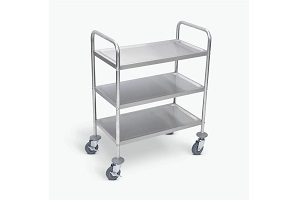What To Do If Your Business is Denied Credit Card Processing

There are many financial complexities involved in starting a business. It can seem like a maze, so most business owners turn to their bank for funding, card processing, and business bank accounts. But, if they decline your request, where should you go?
We’ll be discussing what you should expect when working in high-risk industries and how to ensure that your application is made to the best bank for your needs.
The basics of card processing
Merchant Services has seen a massive increase in popularity over the past few years. Many businesses accept card payments from both retailers and service providers, as well as hospitality businesses. There are two types of card processing: face-to-face payments and customer not present transactions.
Face-to-face transactions require a Chip and Pin Terminal and Merchant Account. Merchant Accounts are the banks that authorize payments and move funds from customers’ bank accounts to the business.
Telephone payments and eCommerce transactions are examples of the customer’s not present transactions. Both require a Merchant Account to authorize payments. In addition, a Payment Gateway encrypts customer data, ensuring that transactions are secure.
Acceptance for payment processing is not always easy. Here are some tips to help you if your Merchant Account or Payment Gateway has been closed.
What is the reason my application for card payments was declined?
As with all financial agreements, you may be denied for processing your card. However, before you look for other options, it is essential to understand why the bank didn’t want your company.
Negative credit
While your business is new, any credit history from previous companies and individuals will be considered when reviewing a card processing application.
Industries with high-risk sectors
These include travel agents, furniture distributors, and pharmacies as well as tech companies. It’s a long list, and you might be surprised at some of the included ones.
There is no processing history
It is difficult for start-ups, but banks may require you to have a strong processing history if your plan is to operate in high-risk sectors.
Documents/Business plan
It is essential to have a business plan and all the paperwork necessary for new companies. The bank’s underwriting department will not accept new applications without these documents.
Why is my company considered high-risk?
Applications that fall outside the bank’s acceptance criteria are most likely to be declined. It is too risky for your new business to be accepted. Many factors could lead to your company falling into high risk, including fraud and historical chargebacks.
Chargebacks are when a customer files a complaint against a business. The chargeback is then refunded. You can then contest the issue to get the funds. A prime example is customers not receiving their goods. The application process for new businesses is heavily influenced by terms and conditions and the complaints procedure.
Can I open another account after my request was declined?
New business owners can be shocked when their cards are declined or terminated. However, just because one bank has rejected your application doesn’t necessarily mean that another bank won’t accept your company.
It’s crucial to understand why your application was rejected. It will allow you to approach other card processors. If your credit has caused your application to be rejected, it is essential to disclose all details about your credit history on your next application.
Each bank has its own set of criteria that changes frequently. Some banks will accept higher-risk companies while others won’t. It’s all about balance and making sure their customers are within their risk tolerance.
It is worth using an impartial Broker when looking for alternative card processing. They should have the latest information on the banks they operate to help you determine where your company is best placed.
For new business, terminated accounts
PayPal and other challenger banks will provide quick turnaround times when it comes time to set up payment processing. However, this has the downside: they may not be able to onboard smaller businesses and then terminate them quickly.
The notice period depends on which bank you use. However, it is possible for this to occur immediately, which could cause additional headaches. It highlights the importance of card processing that is both efficient and cost-effective.
What to Expect When Using an Alternative Payment Processor
Most people will choose a bank that they know and trust with their money. However, depending on what industry you are in, it may not be possible to find high-street options.
It’s not enough to read reviews. It would help if you also researched service levels, especially when you trade online. In addition, you can reduce the risk of fraud by making sure your bank and payment gateway is secure.
Alternate providers that will accept applications from high-risk start-ups and businesses with higher risk may require additional documentation to support your application. They may ask for a rolling reserve to be added to your account.
What is a rolling reserve?
A rolling reserve is a type of deposit that will be placed on your account. It helps to offset the risk associated with processing payments. A rolling reserve percentage of the processed funds will be kept on your account for a specified period. Usually, it is a few months.
It can feel like a big blow to new businesses. Having funds withheld for the first few months can be difficult. A rolling reserve protects both you and the bank. A rolling budget is your safety net.
Card payments made with other processors are more expensive
Even if your preferred bank declines you, the cost of processing with higher-risk banks may not be as high as you think. It’s always worth having a copy of the expenses you have quoted banks (even if they decline). It will allow them to set a level of expectation with their new bank.
Keep these points in mind when approaching new providers. Also, remember why your applications were rejected in the first instance. Finally, it is essential to understand the potential problems that banks might have with your application.
- For new businesses, there should be solid financial projections and business plans.
- A quick qualification call can help you determine if your business is suitable for risk.
- Be sure to have proof of your chargeback procedure as well as Terms and Conditions for high-risk businesses
- Accept terms like Rolling Reserve and longer settlement times
Your chances of getting approved for a bank loan will improve if you take the time to present your application professionally. Do your research, prepare all paperwork and be open to considering other options if you are denied.
Disclaimer. The opinions and views expressed in this article are the authors Shalom Lamm.





